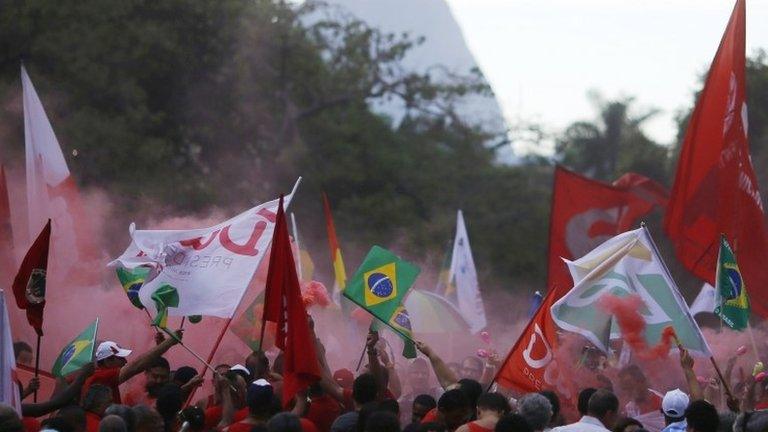Rousseff's woes worsen as Brazil's protesters smell blood
- Published
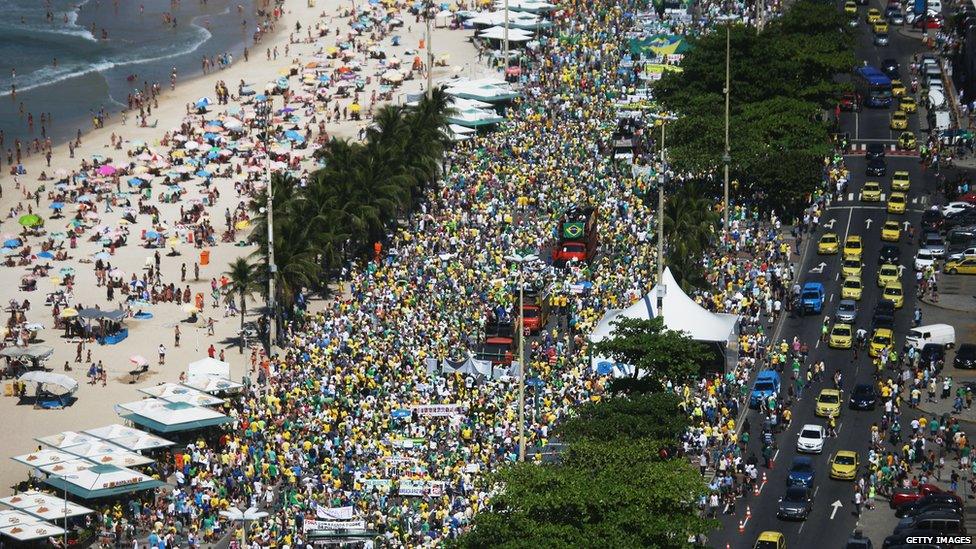
Thousands gathered at the famous Copacabana beach in Rio calling for the president to step down
In cities across Brazil on Sunday, thousands of anti-government protesters again took to the streets to demonstrate against corruption and impunity.
President Dilma Rousseff is fighting for her political survival in the midst of an unprecedented corruption scandal, centred on the state owned oil giant Petrobras. Her woes are exacerbated by an economic downturn that threatens to undermine some of the social and economic progress of the last decade.
For months, frustrated Brazilians have been showing their anger in many ways, most notably the neighbourhood "panelaco" - banging pots and pans in noisy protest.
It was a protest the ruling Workers' Party even tried to turn on its head - using political ads to urge fellow Brazilians to put the pans to more productive use feeding the nation and helping Brazil on the road to recovery.
"We're in a year of transition," President Rousseff says in the ad, in something of an understatement. With inflation pushing 10% and economic recession looming, she is using the ad to promise that Brazil will soon return to economic growth, to what she calls "a better place".
'Our future never happens'
Many Brazilians are not convinced. In the nation's biggest city, Sao Paulo, feelings were running high at what was the largest of the many protests that took place across the country on Sunday.
Numbers were difficult to estimate but there were at least 100,000 yellow and gold clad demonstrators on the main thoroughfare, Avenida Paulista.
"I'm 55 years old and I always thought of this as the country of the future," one protester told me. "But this future never happens because of the way corruption holds us back."
There were similar but smaller protests in other major cities including Rio de Janeiro, Brasilia and Belo Horizonte - where the defeated opposition candidate in last year's presidential election, Aecio Neves, took part in calls for Ms Rousseff's removal from office.
The president's fall from grace has been dramatic.
"Two years ago the popularity of President Dilma was more or less 65%, nowadays it's less than 10%," says political analyst Mauricio Santoro from Rio de Janeiro's State University. "So in just a couple of years it went to the bottom."
He adds: "Dilma has a very serious leadership gap which was not really a problem when the economy was going well. But now her many difficulties are very clear. She doesn't have the ability to put around the table people from different backgrounds, very different social movements and all this is creating many problems for her."
'There cannot be a coup'
Ms Rousseff's nemesis and tormentor-in-chief is Eduardo Cunha - the opposition chair of the lower house of Congress in Brasilia. Influential and socially conservative, he's the one trying to begin impeachment proceedings against the president.
Mr Cunha has been accused by the government of deliberately sabotaging legislation to make life even more difficult for the president.
But while Ms Rousseff's adversaries in Congress continue to plot her downfall, her working-class power base is also out in force.
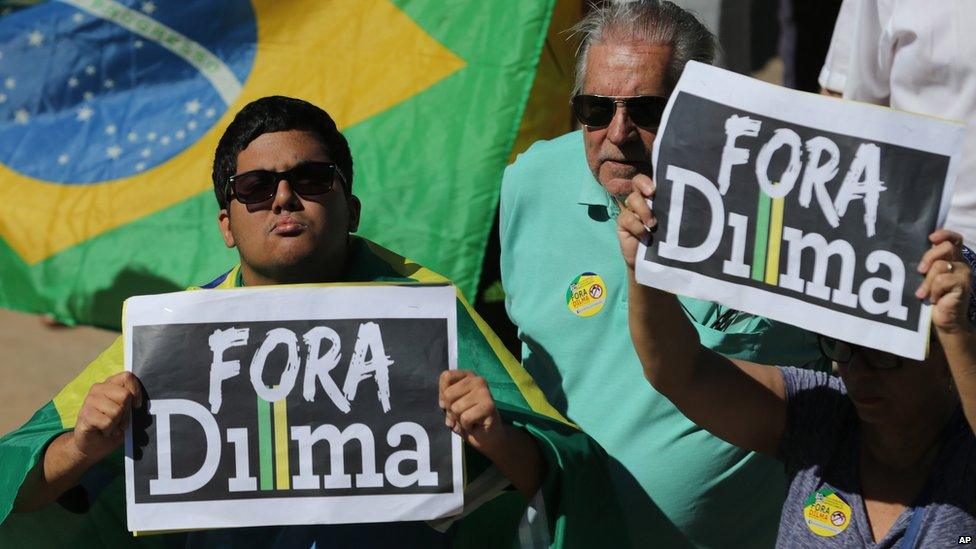
Protesters insisted they had a serious message, holding signs that said "Dilma Out"
Thousands of mainly rural women's organisations marched through the capital last week with a warning that "there cannot be a coup" - constitutional or otherwise.
Their argument is simple: Ms Rousseff has a democratic mandate and has done nothing illegal. To try and remove her by force or any other means would be to weaken Brazil's relatively young democracy.
But the arrests in connection with the Lava Jato (Car Wash) scandal keep on coming. Among them, the heads of some of Brazil's biggest construction companies, several senior figures at Petrobras, and most recently Treasurer of the ruling party Joao Vaccari.
No smoking gun
Nonetheless, says, Mauricio Santoro, given this country's turbulent history, Brazilians are not necessarily in the mood to force Ms Rousseff from office.
"So far the difficulty for the supporters of an impeachment has been the lack of a smoking gun connecting Dilma directly to the corruption scandals, " says Mr Santoro.
"There's the widespread feeling that she knew about it, that she was negligent in controlling Petrobras, but she has not been implicated by any of the investigations. And without that it's very difficult to support an impeachment, without seeing that they're planning a coup."
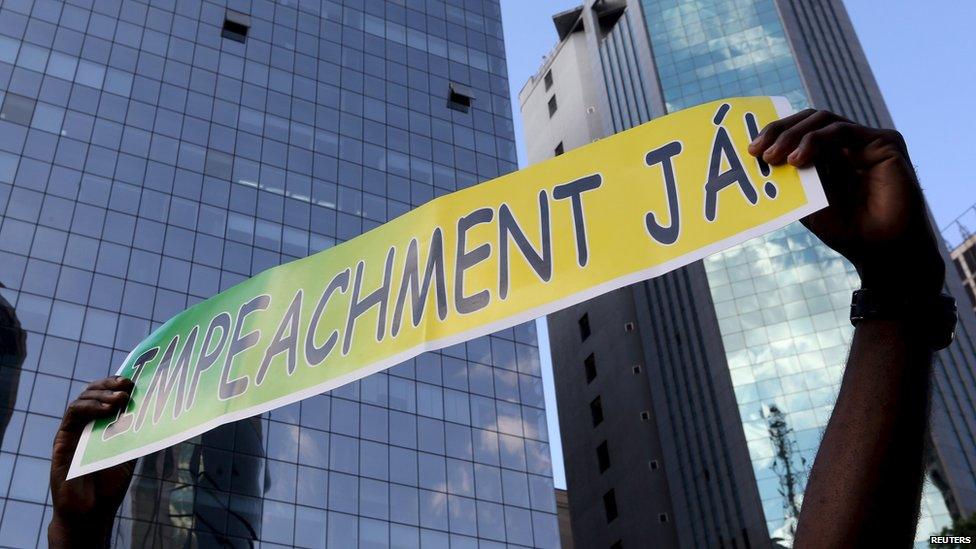
Banners at Sunday's protest called for Dilma Rousseff to be impeached
Uncomfortable and arguably weak at defending herself in public, Ms Rousseff has taken to calling on her much more popular predecessor Lula da Silva to help shore up the government.
Re-elected less than a year ago, Ms Rousseff needs to drastically improve her performance if she is to see out the remaining three years of her presidency.
The protesters on Avenida Paulista smell blood but so far they are the "natural" opponents of the Worker's Party (PT) - white and middle class.
A rising rate of inflation and the prospect of prolonged economic instability are the big issues looking forward.
If and when Brazil's working classes - the mixed-race and urban poor who have always championed the PT - hit the streets as their jobs and welfare come under threat, then Ms Rousseff will really have something to worry about.
- Published17 August 2015
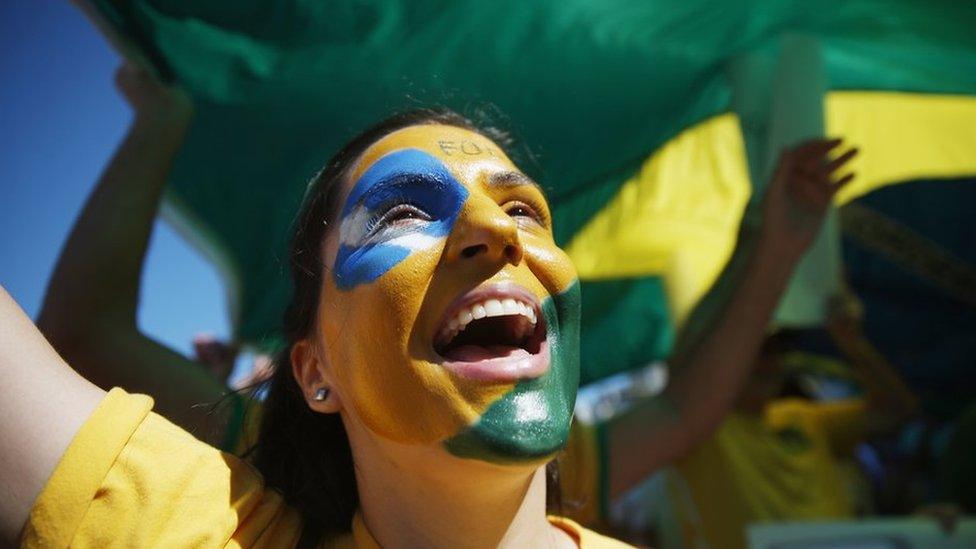
- Published16 March 2015
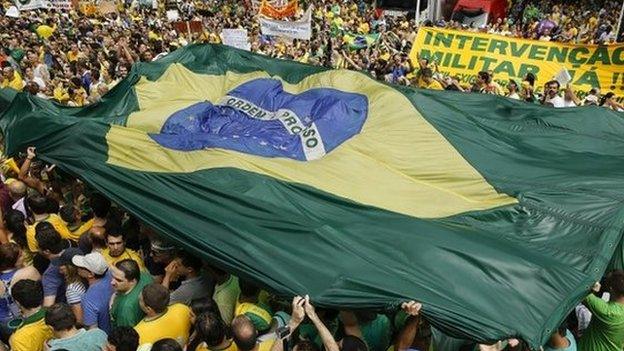
- Published21 November 2014
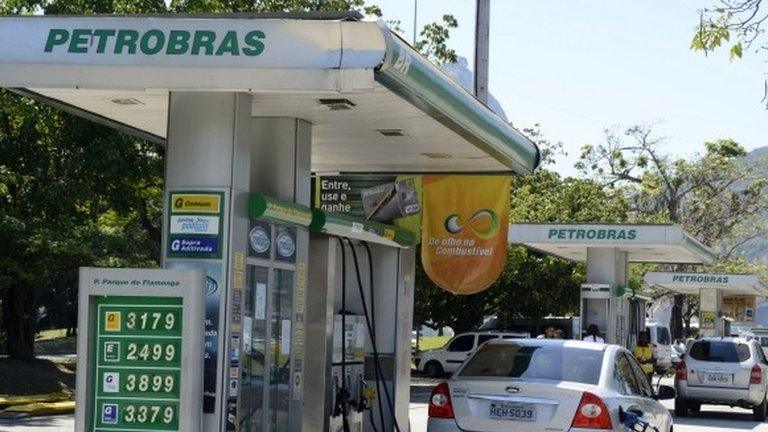
- Published13 March 2015
